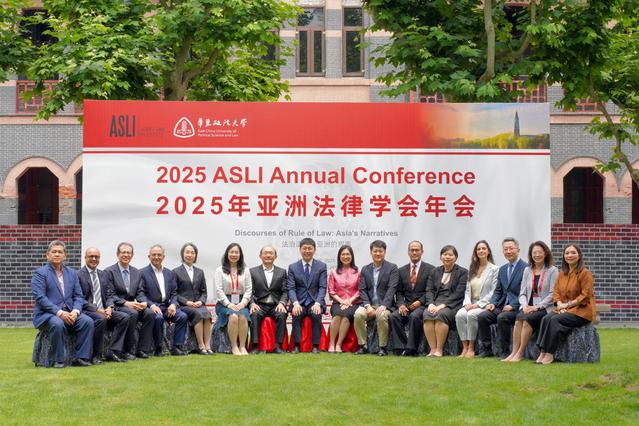
【中国日报】Asian lawyers, scholars urged to enhance global exchanges
【中国新闻网】海内外专家在上海勾勒亚洲法治发展愿景
【中国教育报】第22届亚洲法律学会年会在华东政法大学举行
【法治日报】第22届亚洲法律学会年会在上海举行
【澳门日报】亞洲法律學會年會滬舉行澳代表發言
【法治天地】展开2025年第22届亚洲法律学会年会在上海举行
【上海法治报】第22届亚洲法律学会年会在华东政法大学举行 探讨亚洲多元背景下法治的挑战与机遇
【上海教育新闻网】聚焦“法治的话语:亚洲的叙事”,第22届亚洲法律学会年会举行
【中国新闻网】海内外专家在上海勾勒亚洲法治发展愿景
中新网上海5月29日电 (记者 陈静)“未来的法律人不仅要精通条文,更要成为技术应用与价值判断的平衡者。”华东政法大学副校长罗培新29日对记者说,“真正的价值将体现在那些不可替代的法治思维、价值判断和人文关怀之中。”
记者29日获悉,来自亚洲、非洲、欧洲、美洲等地区的160余名专家和学者齐聚上海华东政法大学参加2025年第22届亚洲法律学会年会,共同探讨法治在亚洲多元背景下面临的挑战和机遇。
据悉,此次年会主题为“法治的话语:亚洲的叙事”,亚洲法律界专家、精英围绕国际投资法、国际仲裁与争议解决、法律多元化等多个领域展开深入交流与探讨。
“法治,是跨越文化差异、凝聚发展共识的纽带。”上海市发改委副主任陈彦峰表示。他从不同层面介绍了上海围绕法治化打造国际一流营商环境的实践。他真诚希望法学专家在此次年会上各抒己见、集思广益,碰撞出思维火花,为上海、中国,乃至亚洲持续优化营商环境建言献策。
“在全球治理面临复杂挑战的今天,亚洲法律人肩负着前所未有的历史使命,我们需要继续推动法治创新,加强区域与全球合作,携手应对共同挑战,共创和平、繁荣、公正的世界。”华东政法大学党委书记郭为禄表示,“作为此次会议的东道主,我们的目标不仅在于搭建一个学术交流与思想交融的平台,更致力于通过深入探讨,勾勒出亚洲法治发展的未来愿景。”
据悉,为期两天的会议共设7组平行分会场,与会专家学者分别围绕十余个主题展开讨论,研讨内容丰富、学科深度融合、实务导向突出、数字赋能明显。从潜在争端,到问题过渡,再到可能的解决方案,在应对全球性挑战方面,亚洲法律人展现了突出的创新能力。来自国际争议解决与风险管理研究所、马来西亚理工大学、名古屋大学等专家就当下热议的全球环境危机提出了看法:环境能源争端与其他争端一样,应被视为一种“风险”。在识别潜在风险之后,应制定适当的策略来避免、减轻影响。
“预计到2030年,亚洲在全球经济中的份额将上升至58%左右,我们需要继续推动法治创新,促进区域和全球合作。”上海公共外交协会会长周汉民在题为“全球治理中的创新与共识:亚洲法律人的贡献”的主旨发言中表示,“我们期待更多的合作与对话”。
“国际法治是世界和平的基石,我们希望以亚洲法律界的智慧与行动,为世界注入更多稳定性和确定性,共同书写国际法发展的新篇章。”世界贸易组织上诉机构前法官、北京大学法学院赵宏教授在发言中呼吁。
据了解,随着亚洲跨境商业的蓬勃发展,商事仲裁已成为解决争端的首选机制。这些区域法律机制的建立和完善,推动了多边对话与合作,开创了和平解决争端的新途径。在“国际投资法”“国际仲裁与争议解决”“知识产权法”等平行分会场讨论中,与会嘉宾就深化区域经济一体化集思广益,希望通过法律服务贸易、数字贸易等领域合作,进一步促进区域经济发展,优化亚洲跨境商事仲裁规则,探索统一仲裁标准与电子证据采信制度,通过标准化技术信息披露流程降低跨境侵权风险,提升裁决执行效率,完善跨国维权法律援助机制。
“亚洲价值观的法治叙事更强调社会稳定、集体利益和价值观念。”华东政法大学国际交流处处长、国际教育学院院长伍巧芳提出,“这样跨国界的交流有助于增进相互理解,推动亚洲乃至全球法律文化的融合与发展。不仅有助于加强区域内国家间的相互信任,也为国际社会提供了和谐共处新范式。”
会上,专家学者探讨如何将新技术融入法律教育,提出了诸多培养具有创新思维和实践能力的法律人才等建议。马来西亚泰莱大学专家安比卡伊.辛格姆(AMBIKAI S T SINGAM)展示了“刑事司法VR实训系统”。该系统通过还原典型案件场景,使学生在沉浸式体验中掌握证据链构建技巧。 VR技术促进了协作学习,使学生能够在虚拟环境中一起交流,不受空间限制。这种创新的教学工具不仅提高了学生参与度,多样化的教学方法也提高了学生对法律信息的记忆能力。
据悉,2026年亚洲法律学会年会将由印度尼西亚大学法学院承办。
CHINA DAILY Asian lawyers, scholars urged to enhance global exchanges
By Wang Xin in Shanghai | chinadaily.com.cn
The 22nd Asian Law Institute Annual Conference takes place at East China University of Political Science and Law in Shanghai from May 28 to 29.
As Asia gains more prominence in the world, it is increasingly significant for Asian lawyers and law scholars to make their voices heard and promote mutual understanding and exchanges globally, said experts at the 22nd Asian Law Institute Annual Conference in Shanghai.
Hosted by East China University of Political Science and Law (ECUPL), the conference was held from Wednesday to Thursday and gathered over 160 scholars and experts from across Asia, Africa, Europe, North America and Latin America. Themed Discourses of Rule of Law: Asia's Narratives, it explored diverse topics and sectors such as legislation, social governance, economic development and more.
Chen Yanfeng, deputy director of the Shanghai Municipal Development and Reform Commission, pointed out at the conference that the rule of law is a bond transcending cultural differences and a consensus for development.
Asia's share of the global economy is expected to rise to about 58 percent by 2030. We need to continuously promote innovation in the rule of law and foster regional and global cooperation, said Zhou Hanmin, chairman of the Shanghai Public Diplomacy Association.
Guo Weilu, chairman of University Affairs Committee at ECUPL, added that at a time when global governance is facing complex challenges, Asian legal practitioners are shouldering an unprecedented historic mission. They need to promote innovation in the rule of law, strengthen cooperation and join hands to address common challenges for a peaceful, prosperous and just world.
The 22nd Asian Law Institute Annual Conference takes place at East China University of Political Science and Law in Shanghai from May 28 to 29. [Photo provided to chinadaily.com.cn]
The Asian Law Institute, initiated in 2003 by the law schools of 16 Asian universities, dedicated to research on the region's laws and the development of law education and exchanges. Over the past two decades, the institute has been witnessing massive changes and increasing scholar engagement from across the world, according to Kelry Loi, co-director of the institute and professor at National University of Singapore.
As the Asian economies develop, people are starting to realize the value in learning about Asian perspectives. We see more mutual understanding and mutual exchanges rather than the one-way lecture. That's a profound change that has occurred over the last 20 to 30 years, said Loi, adding that the institute is open to law schools from all over the world who are interested in Asian law.
Loi also noted that China's visa-free policies are helping more global law scholars visit and observe the country, thus helping them understand the place better for future collaboration.
Steven Van Uytsel, a Belgian professor working at Kyushu University, was among participants at the conference. Having lived in Japan for 24 years, he made his first impressive and enjoyable visit to Shanghai for the conference and saw a generation shift.
A lot of new faces are now appearing in the conference, especially among the presenters. I'm happy to see this kind of generation shift as I think that's important to cultivate the younger generation, give them the floor to voice out and grow. This conference is a good and important platform for exchanges, and I think it should continue, he said.
